I’m on record as being a bit of a Pixar geek. Up is one of my favorite movies. Inside Out gave me a whole new lexicon to talk about feelings. What other studio can boast such a high percentage of movies with a 90%-or-greater “Freshness” rating on Rotten Tomatoes? (I’ll give you a hint: none.)
Moreover, Pixar’s films—though made ostensibly for children—have typically offered remarkably mature messages. These folks have dared to communicate rather unsexy truths about responsibility, selflessness, sadness, etc., and in such beautiful, engaging and really fun ways. They made you laugh. They made you cry. And yet, they almost always made you think a bit, too.
All this and more made plucky Pixar the gold standard of creative animated storytelling for two decades or more. Every other studio—including parent company Disney, the revered Mouse House itself—was fighting for second place.
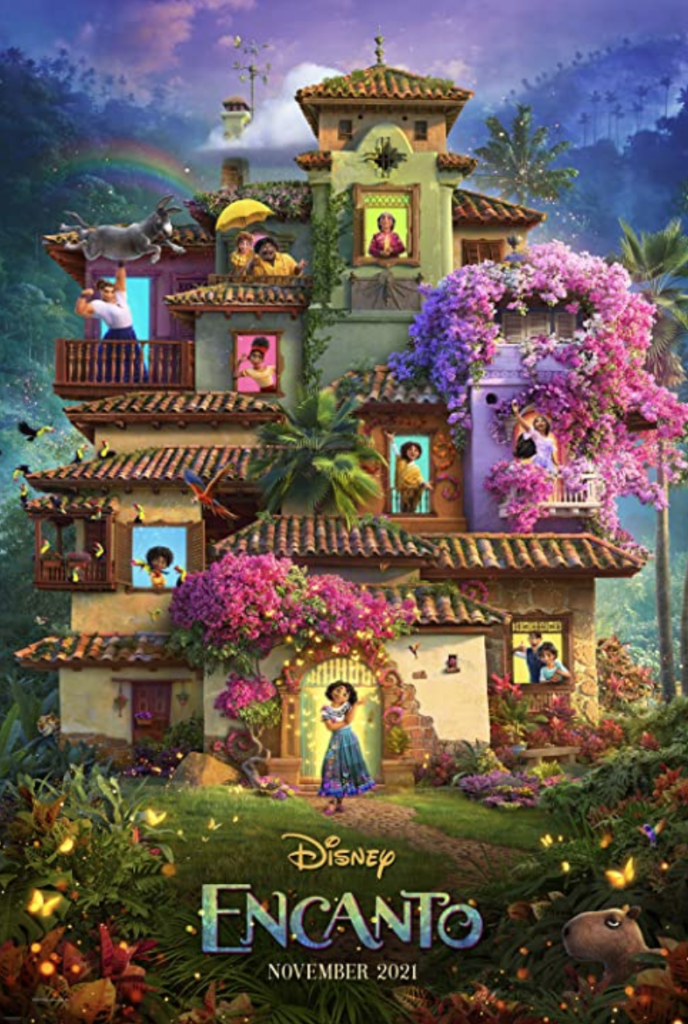
No more. And while that change has probably been in process for a few years now, two recent movies illustrate that shift particularly well: Disney’s Encanto and Pixar’s Turning Red.
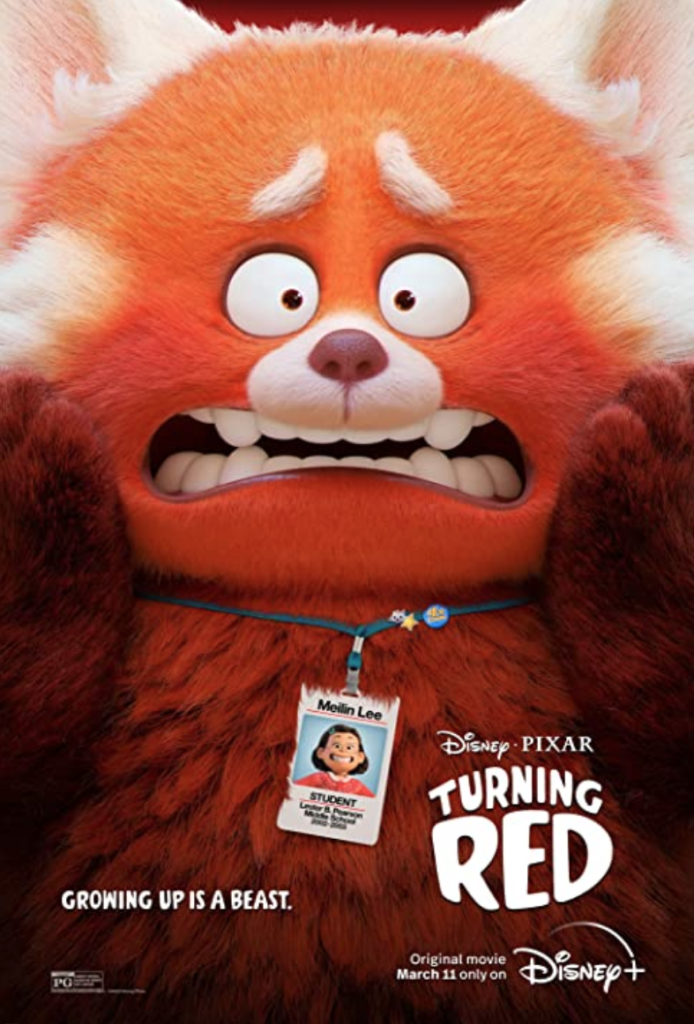
Both focus on girls in their early-ish teens. In Encanto, we meet 15-year-old Mirabel Madrigal, a non-magical girl living in a wildly magical house. In Turning Red, 13-year-old Mei is our focal point as she discovers that adolescence comes with an unexpected challenge: She turns into a giant red panda.
Both girls love their respective families. But both of those families are, in their own ways, incredibly demanding. And our respective protagonists are struggling to deal with their familial responsibilities.
Mirabel’s Colombian casa is a multigenerational compound—ruled lovingly but firmly by Mirabel’s Abuela. Long ago, after a devastating tragedy, Abuela Madrigal and her family were given a miraculous gift—a magic candle that bestowed magical gifts on (almost) every family member. For generations, those gifts have been used to bless and benefit the surrounding community.
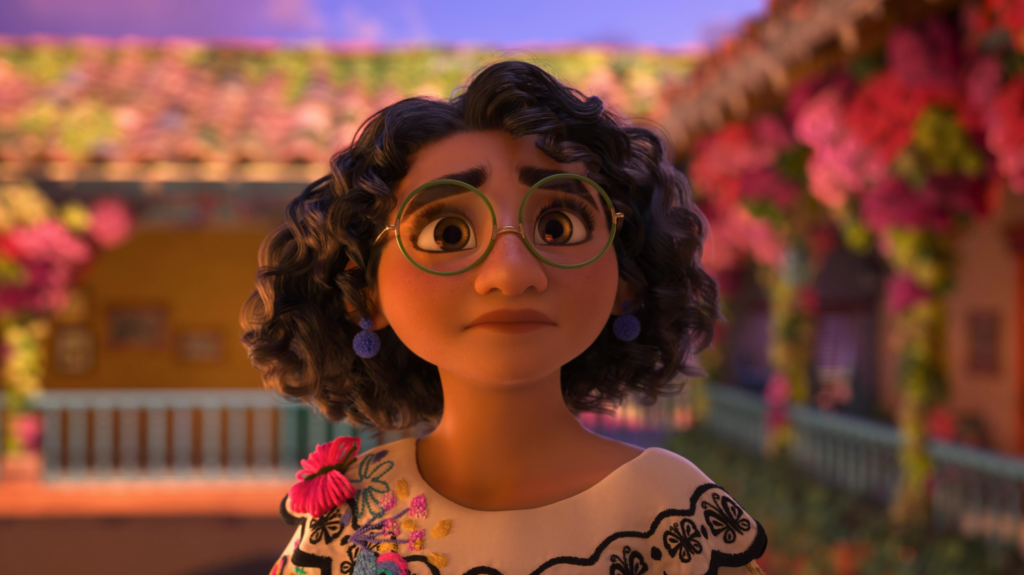
But over time, that sense of duty—and more importantly, Abuela’s own sense of how that duty should look—has taken a toll on the family. Most members don’t speak about it. Some dare not even think about it. But super-strong Luisa worries what might happen if she carries too much weight. Graceful Isabella can conjure up beautiful flowers; but sometimes, she’s just in a cactus mood, y’know? And that sort of divergence is something that Abuela just won’t tolerate. In the song “Surface Pressure,” Luisa voices what many a Madrigal feels: “Who am I if I can’t carry it all?”
Meanwhile, in Turning Red’s Lee family, Mei thrives under her mother’s exacting standards—until her inner panda begins to make its presence known. She really wants to go to a boy-band concert that her mother feels is inappropriate. “We’ve been so good!” Mei gripes. “If [parents] don’t trust us anyway, what’s the point?” So she starts lying and sneaking behind her mom’s back. That, too, is a reaction to the pressure her own family puts on her to be their perfect little girl.
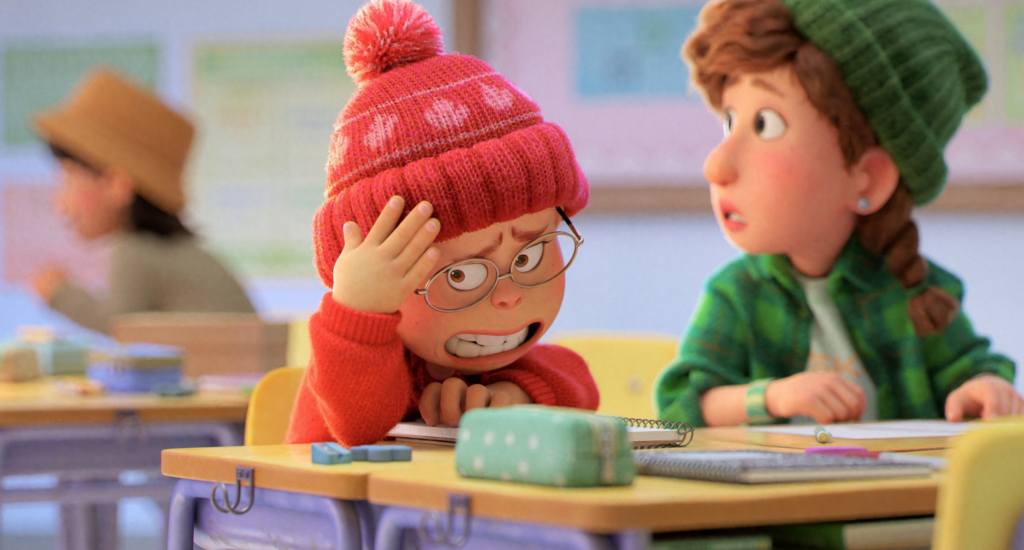
So both stories are about perfection, too—the pressures that a family can place on its members and the pressure that children feel to meet those expectations.
In real-life adolescence, those expectations and the growing understanding that you’ll never meet them—that you might, in fact, be a very different person than your parents might like you to be—often hit a crisis point. And that happens in both of these movies, too. Our respective heroines have showdowns with their much-loved, very demanding matriarchs. But the messages the movies set down for us are quite different.
In Pixar’s Turning Red, Mei’s mother (and the rest of the Lee women) participate in a ceremony to rid Mei of her pesky panda spirit animal. But during the ceremony, Mei decides she wants to keep the panda—even though it sometimes makes things messy. Moreover, she’s going to that boy-band concert with her friends. And at that concert—after her mother follows her to it—Mei plants her flag and says that, at the age of 13, she’s her own woman now. She’s not going to do everything her mother says.
“I’m not your little Mei Mei, Mom,” she says. “I lied … I like boys! I like loud music! I like gyrating! I’m 13! Deal with it!”
As I said in my review, Mei has some valid points here. Mei’s not her mother’s little girl anymore. And Mom should acknowledge that Mei’s growing up … and growing into her own skin.
But let’s be honest: Most 13-year-olds aren’t exactly masters at making wise, healthy, thoughtful decisions. And letting teens drive their own lives without setting down some really serious guardrails can have serious, sometimes tragic, consequences. In Turning Red’s time period (the early 2000s), those consequences were dangerous enough. But now? With technology and social media opening so many doors for teens that they might not fully understand? The movie’s message of letting your teens do their own thing seems, honestly, a little irresponsible.
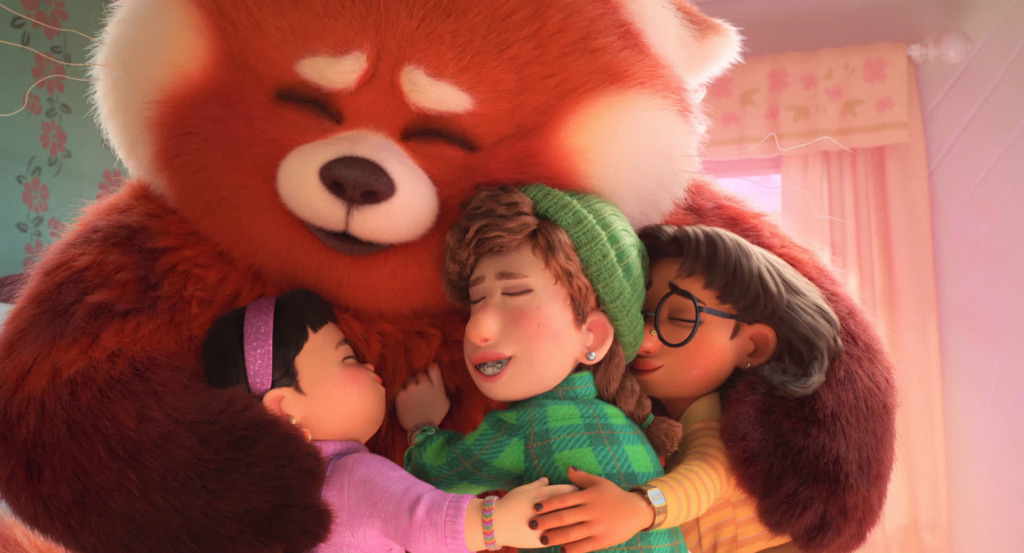
“My panda, my choice,” Mei says at the end, a riff on the pro-choice catchphrase of the day. But choices come with consequences—not just for the people making those choices, but the moms and dads and family and friends who love those people. And parents still need to be deeply involved in their kids’ lives … even sometimes when their kids would rather they not be.
For decades, Disney had long peddled one series of messages above all: Follow your dreams. Be true to yourself. Don’t let anyone get in the way of who you want to be. And those are not inherently bad messages … if put in some context. But sometimes, those same messages—where “I” trumps “we,” where individuality trumps community—can be harmful, both to the individual and community.
With Turning Red, Pixar took this simplistic, oft-told package of messages and put it in a furry red box. Here, Mei’s “me” bests the movie’s “we.” And it left the story not just a little lacking in Pixar-like depth, but it hurt the movie itself. It didn’t feel as rich. As beautiful. As fun.
Meanwhile, Disney’s Encanto went Pixar on us.
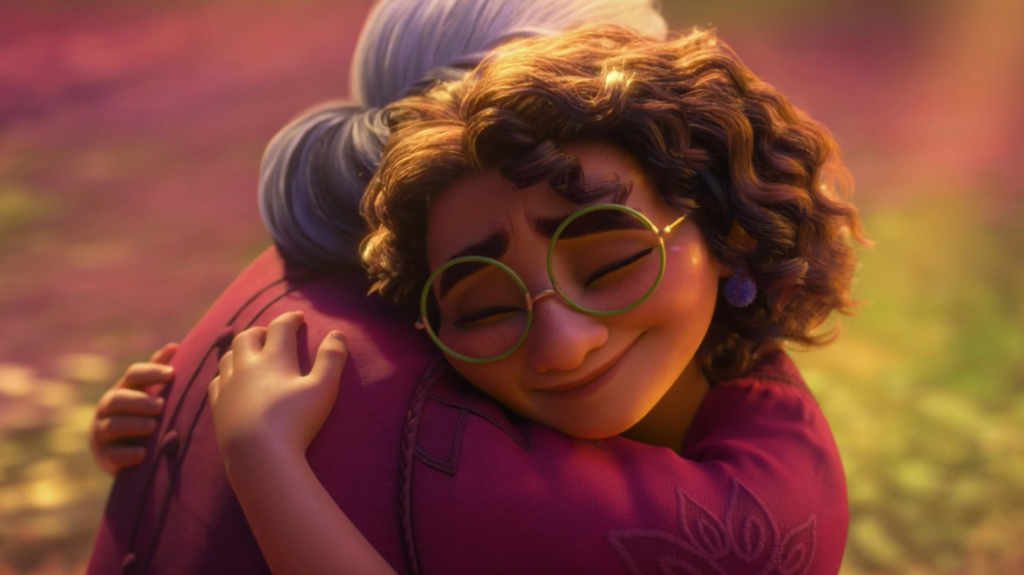
Mirabel also pushes back hard on the strictures and constraints that her Abuela had placed on her and on the rest of the family. When the Madrigal house begins to break, Abuela blames Mirabel for the fractures. But Mirabel—in a burst of anger—points out that it’s Abuela who’s doing the breaking.
And she’s right. By the movie’s end, everyone knows it. And it takes the nonmagical Mirabel to rescue the family’s magic.
But here’s the difference. Turning Red ends, literally, with Mei walking out of the family temple to be with her friends—telling her mom, essentially, so long and don’t wait up. Meanwhile, Encanto ends with Mirabel at home—a home she’s helped rebuild. She’s with her family, all of whom (thanks to her frank talk) have both a renewed sense of who they are and a renewed energy to do the family, and the community, proud.
If the “I” tops “we” in Turning Red, in Encanto, the “I” and “we” walk together—both aspects strengthened and enriched by the other.
I think we can hear echoes of God in that.
God designed us to be who we are, each with our own gifts, our own challenges, our own weaknesses. We are golden strands in His grand tapestry, and we shine through our individuality.
But we are, of course, part of that tapestry. We were not designed to live only for ourselves. We were designed to work with, and live for, each other, too. Our stories are part of bigger stories. We are pieces of other puzzles. We are parts of families, be they bonds of blood or affection, whether we live in the same house or not.
There’s a paradox in play here, a paradox that Encanto gets and that Turning Red does not: We are most ourselves when we understand our ties, and responsibilities, to others. Our individual character shines brightest when we’re part of our team.
Turning Red is not a bad movie. It’s kind of fun, kind of true. But its bright red panda takes a back seat to Encanto’s multicolored, magical house—a house filled with rooms, a house filled with family, a house filled with beauty and meaning.
Maybe Pixar can learn—or rather, re-learn—something from its larger studio partner.



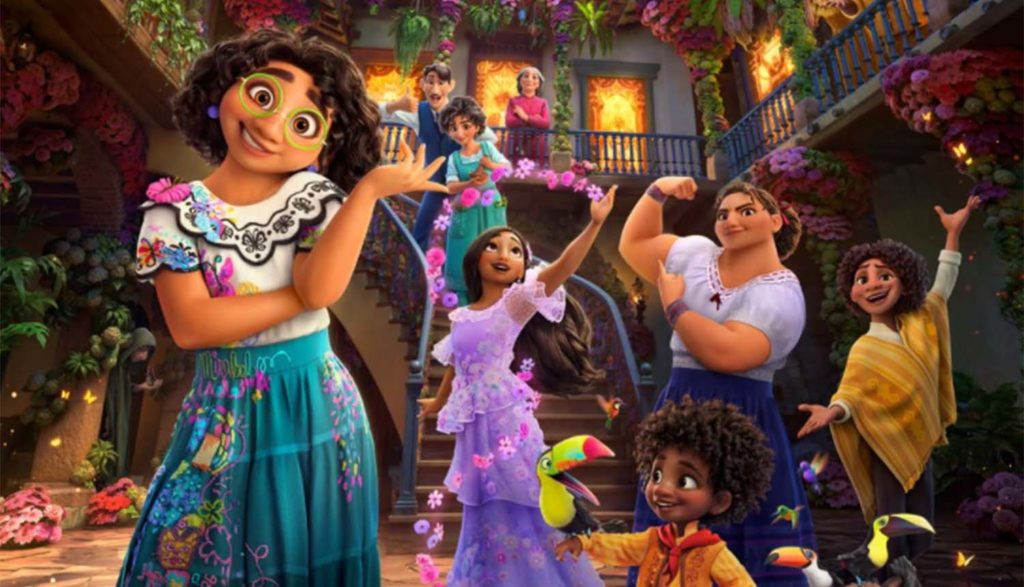



53 Responses
-In my opinion Pixar’s been on a downward slide for awhile now as evidenced by the downright horrible toy story 4 soul and cars 3 and the not nearly as good as it could have been coco. Pixar’s still capable of wowing me like in the ten times better than the original Incredibles 2 and the better than it has any right to be onward, but I haven’t even tried Luca or turning red or even encanto for that matter and don’t plan on anytime soon. It’s sadly apparent that the days of ratatouille brave inside out big hero 6 the princess and the frog or even finding Dory are behind us now.
-In fairness Encanto, Big Hero 6, and The Princess and the Frog aren’t Pixar.
-I realize that but plain old Disney has been suffering the same fate as Pixar of late. I’d argue that except for Ralph breaks the internet Disney hasn’t released a quality animated film since big hero 6. I know tons of people love moana and Zootopia but I’m not one of them.
-They both are amazing in my opinion,but turning red is using pixars main trend so it can pull more views
-Soul was great
-Soul had wonderful jazz music I’ll give it that, but there was just so much spiritual mumbojumbo in it that it became kind of sacrilegious to me. Plus the whole thing was simply boring as heck too, so to me Soul fell flat on its face.
-“But here’s the difference. Turning Red ends, literally, with Mei walking out of the family temple to be with her friends—telling her mom, essentially, so long and don’t wait up. Meanwhile, Encanto ends with Mirabel at home—a home she’s helped rebuild. She’s with her family, all of whom (thanks to her frank talk) have both a renewed sense of who they are and a renewed energy to do the family, and the community, proud.”
So to sum up: we like the movie where the girl knows her place is in the home, not the one where she might leave to be her own independent person with a career and a life. This is disgusting.
-That’s not what they mean, and you probably know that. But I’ll explain.
Mirabel is not staying in the home instead of claiming independence and life, she genuinely loves her family, and wants to stay. She helps to rebuild the relationships that have gone brittle and are cracking. One day she may choose to leave her Casita and family, but she will leave with a strong family bond that will allow her to maintain relationships with them. Whereas Mei is burning bridges that she will need one day, and she will struggle in finding her way through independence and life without them.
Mirabel found independence at home, and that makes her stronger, while Mei is choosing independence without family, and without guidance. And while Mei may not need family, she will need guidance.
That’s what they’re getting at. You see?
-For me Mei is not abandoning her family/responsibilities but striking a balance with her mom. She still happily helps at the temple but finds time to be with her friends, something she always neglected. Her father now covers for her when she leaves so he is also more involved in the temple.
-I think Paul’s biggest hang up with Turning Red is that Mei’s new balance seems tilted in favor of Mei being out in the world at an age when she might still need some parental guidance in navigating it. Don’t the me wrong. I liked the movie, and I related it to the point that I cried over it, but I will admit that the movie glossed over certain nuances. For example, $200 for a concert is totally outrageous even by today’s prices, and expecting your parents to shell out that much money just so you can indulge in your romantic fantasies is not reasonable. Not even her friend Miriam’s presumably more relaxed parents were okay with paying so much.
-Mei did not demand money from her parents. She and her friends worked to get the money.
-everyone likes independent girls, but come on. when your thirteen years old, you shouldn’t be having that type of attitude towards your own mother. at least in Encanto, Mirabel is sorry and doesn’t even want to pull away from her family or even disrespect them in any way, but in Turning Red, that movie is encouraging rebellion and lying- at that young age of 13!!
Yes, a girl of that age should know her place in her home, but later in life when she grows older and matures more, she’ll get her chance to be her own (in your words) independent person with a career and a life. It’s not disgusting. What’s disgusting is that Pixar is promoting rebellion and “independence” at 13.
-To be fair though, it is not true that Mirabel always was obedient and respectful.
She kept doing her investigations even after Abuela told her to stop it.
And she also was the one, who had to tell her grandmother that the family suffered.
She even said that Abuela was the reason why the miracle was dying.
Which no one else in the family would have dared to do.
And I don’t believe that comparing these stories is really fair anyway.
Teenagers in two such different settings wouldn’t necessarily act the same way…
-i agree with your view on turning red, but, not a very convincing takeaway from encanto.
the film is very latino, and family/community are very important. that is not a bad thing. mirabel helped her family accept they are allowed to have flaws, and that it’s okay to accept help from others.
i think the issue is comparing them at all. they’re both sending good messages and should be allowed to be their own movie. neither is a standard. the lessons they teach can and should coexist.
-The point is Mirabel is still with her family while Mei is walking out not even slightly thinking about the challenges she’ll have to face in her future
-That wasn’t well worded.
I think the difference for me is Mei is 13 and still a minor, a child.
There has been a strong message to undermine parental rights for some time. The push for a young teen to get birth control and/or an a proton. Yet my teen needs my consent for dental procedures.
I feel like this aspect of the movie is not by coincidence.
-*an abortion
Auto correct got me
-Agreed
-With respect, I find it really interesting that every single person I’ve seen throwing (in my opinion, confusing and unjustified) hate at Turning Red is a man. I’m a female who grew up in the same time period and I was struck hard by how relatable and poignant the movie was to me. Please consider broadening your horizons and attempting to relate to experiences that don’t closely mirror your own? If you can relate to a talking car, you can relate to Mei.
-As a girl who also grew up in the same time period, I totally understand relating to this movie. Some parts hit so hard that I actually cried. At the same time, I can see where Paul is coming from. I mean, he is watching these movies through the lens of a parent who is going to have to deal with the fallout of his/her children emulating the movies’ core messages. Besides, I don’t think he hates the movie. He just thinks that the movie’s message is favoring one ideal at the expense of an equally important one and that the imbalance could potentially steer kids and teenagers down the wrong path.
-I totally agree that Turning Red was a good movie. I think they might have been giving turning red in the comments shade to make Encanto shine more. Both movies send an amazing message! if you look for more nuance and serious movies you will think encanto is better if you like comedy you’ll like turning red better.
-We will remember Encanto. We’ll also say “What was that movie with the red panda?”
-I am a woman and I agree with this review completely. Today’s modern views and opinions are so worldly most Christians don’t even see that they themselves have been caught up in it. Things that God tells us is wrong the world says is right and vice versa. A 13 year old should not be treating her parents like that. All throughout the Bible God tells us it isn’t about us. Our lives aren’t ours or for our own glory but God’s. He condemns selfishness, lying and pride. Turning Red is so full of all three that just those three alone makes it a bad movie. Let’s also not forget the part of the Bible that tells children to obey their parents. That doesn’t mean they are to be drones but they are to respect them, and Mei does not. Just because mostly men are responding, or that is article was written by a man, doesn’t mean they are wrong. God has given them wisdom. But what it does mean is that you have lost your way and need to read God’s Word more. Don’t let the world fool you and turn you away from God’s love and guidance.
-I’m sorry but this is a really, really condescending response. Because I enjoyed a harmless kids’ movie and related to it, I’ve “lost my way and need to read God’s Word more”? Encanto is chock full of ungodly magic and what some would call witchcraft – just a short 15 years ago, PI probably would’ve condemned it; they were a lot harsher on movies back then – but if I’d said I preferred Encanto, you wouldn’t have admonished me to “read God’s Word more!” Something about planks in eyes and so forth.
-Why would the magic in “Encanto” necessarily be ungodly?
There’s a lot of talk in this movie about “the miracle”.
And that could mean that the magic ultimately came from God.
Sure, it is never really explained how the miracle happened.
But calling the whole thing “ungodly” is wrong.
-Criticism is not hatetred. It can come from hatetred, but often it is not. The news media and the internet amplifies criticism as the same thing as hatred to make you upset, so you click on click bait and they get ad revenue. Pluggedin is a decent website for movie reviews as they are not being paid to promote them. Do I think that male reviewers miss things? Yes, I do, but Pluggedin is at least a site that doesn’t say female characters that dress modestly are boring. I feel that Rose from the new Star Wars had to bear all the blame for the incongruent and unoriginal plot (if she’d worn a bikini she probably would have been lauded by fanboys as a powerful woman instead of being insulted so much that the actress was unfairly treated.)
-I didn’t really see a problem with Mei asserting her individuality over her mom, but then again, I kinda forgot for a little while that she was only 13. I’ve definitely gone through a stage of life where I made choices my parents wouldn’t have approved of, but that didn’t happen until I was over 18.
-Just to clarify, I wasn’t making any particularly destructive or irresponsible choices. I just started questioning things about myself that my parents weren’t willing to accept, like “Is this extremely prestigious career that I chose for myself unprompted as a child really what I want to be?” Considering that said career turned out to be a poor fit for me, I probably should have leaned into that question a lot more than I did at the time.
-Frankly a movie about a thirteen year old girl crushing on boys, getting her period, and turning into a giant red panda everytime she can’t control her emotions sounds like one of the worst ideas for a movie I’ve ever heard, and I’m not the only one. My 54 year old sister and 77 year old mother also thinks it sounds stupid and has no interest in seeing it either.
-Maybe if you watched it you’d realize it has nothing to do with a 13 year old girl getting her period.
Anyone who says it is didn’t actually watch it and don’t know what they’re talking about.
-Plugged in says that’s a big part of the movie along with other puberty related stuff and that alone makes me not wanna see it. It was cute in My Girl but in this movie it just seems icky, and this is coming from someone who grew up with two older sisters and a mom since my dad was only around until I was ten and then he quite literally disappeared for the next fifteen years or so until the social security office found him.
-If you have no interest in it, then why are you here?
-I haven’t seen Turning Red but have seen Encanto. The trailers for the former have turned me off of the film, mainly due to the rudeness and disregard for respect of the family. I have a 13 year old and I am concerned about the influence this film may have on her behavior. Encanto, on the other hand was and is a beautiful film with good influences that I am pleased about, that of helping others and helping family through this difficult life.
I recognized in Encanto the truth that we are all blessed with various gifts from God and we are to use those gifts for the benefit of others.
In Turning Red, I have yet to see any saving grace. It can be surmised that “going to a concert”can be replaced with “going to a party with friends” where often this leads to underage drinking, premarital sex, and other vices.
No thanks Pixar.
-Maybe if you watched it you’d realize it has nothing to do with a 13 year old girl getting her period.
Anyone who says it is didn’t actually watch it and don’t know what they’re talking about.
-Love this article – Great insight and well written with heart ❤️
-this isn’t a great analysis of turning red, and it seems more like a slippery slope than genuine concern for teens.
what we all wanted at that age is respect. that is what turning red is about. mei’s issues were always with how her mother treated her like a baby. she’s 13, she’s going through puberty, and she (aswell as many young girls out there) doesn’t want to be ashamed of it, or hide from her family who she is.
her mom is hellbent on making sure she is still her innocent little baby who can do no harm, which adds a ton of pressure on mei, and causes interpersonal tension.
i can’t see at all how you arrived to the conclusion that this is about letting kids doing whatever they want without supervision or guidance. this is more showing what happens when you refuse to give kids those things in favor of stuffing all the hard cringey stuff in a box (or in this case, a necklace).
i urge you to give this movie another look. it’s very important in a lot of ways to youth, and parents.
we all liked encanto, but it doesn’t have to be the *only* good movie. we can have both, and hopefully many more in the future.
-Yours is one of the most unbiased responses…there are maybe 3 or 4 references to Mei getting her period…and these were not very overt. We have to assume that her turning into a panda coincided with her period’s onset, as that is what Mei’s mother assumed the emergency was, when it was in reality because she turned into a panda.
Mei did not walk out on her family. She made it a point to have more balance in her life-with her family’s blessing and understanding. Nowhere did the film imply that it is ok to lie to your parents, pay $200 for a concert ticket, do something crazy to get money for said ticket, or disobey and go anyway. I saw it more as rebellion to the extreme, brought on partly by the repression and disregard of Mei as her own person with emerging wants needs and desires…and Mei had to learn lessons and consequences, but it also brought her family closer together…they too had to learn lessons and consequences.
I also do not think there is anything gained by comparing the two movies point for point. This it too simplistic and the author did not do a very good job in that regard. Also spare me the Christianity mumbo-jumbo. Many people in China are Buddhist. The oh-so-tolerant Christians…of themselves, but not of others.
Each movie should be looked at as its own theme and not tried to be boxed in what we should think it should be.
I am getting ready to watch Encanto. Saw Soul and loved it. Saw Sing 2 and loved it. It is easy to talk trash about someone’s ideas…how about making a more perfect movie instead!
-Didn’t read this article as I haven’t seen either movie yet but Disney owns Pixar so like who cares it’s all the same money making machine.
-Did…you not watch encanto all the way through though? Part of the whole message was that abuela NEEDED to trust her children/grand-children. So if you’re telling me that Mei’s mom was doing the wrong thing by letting her kid grow and experience the world in her own way and without constant supervision then it feels like you’re saying Mirabel was in the wrong? 🤷♀️
-I don’t think that’s what he’s saying at all. I think he’s just pointing out that Turning Red glosses over some of the nuances of changing family dynamics that come with growing up. Sure, growing up means needing more freedom to make your own choices and to explore, but it also demands growing in wisdom so that you make responsible choices. Turning Red kinda hammers home the first half of that sentence and glosses over the second half.
-I have seen Encanto, and I loved it that Mirabel is the one who keeps her family together, even though she has no “magic” powers and is not special.
Since I am trying to be an artist, watch most Disney/Pixar/DreamWorks kids movies, and am a woman, part of me does make me want to see the Turning Red movie, but the reviews make it sound embarrassing. the trailer didn’t appeal to me. We should teach young girls to find strength and dignity in womanhood and not be ashamed of their bodies.
I feel like for a long time Disney movies were telling kids to be comfortable with who they were, like Mulan, The Lion King (Simba has to learn for himself to throw off the false guilt from Scar), and Moana.
I mean, there are parents that are bad but forbidding your child from attending one certain concert is not evil. Yes, maybe the parents are overreacting but encouraging teens to rebel instead of asking why first is not good advice. My mom had strict rules: the only pg-13 movies I was allowed to watch were Lord of the Rings and Left Behind. I had to skip Star Wars Episode III for years. She also banned any number of PG movies, such as The Incredibles (because the trailer made fun of the dad for being fat, and no, my mom was not fat.) But I respected her I did okay, and watching The Princess Bride, Spider-Man, HP, and National Treasure as an adult was so fun that I don’t believe I missed anything truly important in life by waiting. I feel I have learned more through this and that it’s okay to not do something just because everyone else is doing it. Although, not understanding sexual innuendo has been annoying sometimes (I was homeschooled.)
Maybe I’ll see Turning Red when it comes to my library, I don’t know. Sometimes I like movies that the majority don’t like. Like, even though Captain Marvel’s powers are so strong that it impedes character growth in her movie, I connected with her way more than the playboy, billionaire Tony Stark we see in the first Iron Man. I mean, being a fan girl of a womanizer would feel weird to me, as a woman, although we did see Stark change later and it was awesome to see his love for his family in Endgame. Not that I’m a fan girl of Captain Marvel, per se, as Spider-Man is my favorite superhero and I only seem to find time to read one comic book series at a time.
-Why must you pit two beautiful multicultural stories against each other? They are both wonderful movies with great meaning. Your description of the ending scene makes it sound like you haven’t watched it: “telling her mom, essentially, so long and don’t wait up.” This isn’t what happens at all. Mei is depicted helping her mom rebuild the temple, but “taking some days off,” which every teenager deserves. And she certainly doesn’t leave her family behind for her friends. In fact, she is going out to karaoke with her friends for the afternoon but promises to be back for dinner. The ending scene displays her journey in balancing her individual identity and preferences with those of her family, and how that journey makes things better for everyone. I’d encourage you to examine more thoroughly your prejudices before you make comments on multicultural stories that you may not understand.
-Wow so much “ewww young girl getting period movie, nope”
Except it wasn’t about a young girl getting her period at all. If you watched it, you would know.
Didn’t anyone grow up and reach that point of coming of age needing to have personal space and be your own person? Seriously. So much ignorance in the comments.
-the evidence isn’t cool It has nothing to do with the fact that they think Encanto is better than turning red which I sorely disagree. Encanto is a movie about generations and trauma and people with powers/quirks there’s really nothing wrong with that. The fact that they’re trying to say it’s better it’s really not is about 97% equal the girl in turning red mei mei is a girl trying to get her mother’s approval like the girl in Encanto called Mirabelle. Maribel wants her Abuela to understand that she’s different. and so does mei mei . Encanto was WRONG for saying Bruno is bad *spoiler * bruno is good and loves his friends such as rats he lonely but that’s when Mirabelle comes into action .
the truth is I love both of these movies equally they are great so stop trying to make them go against each other .
Very helpful article. Thank you.
-Late to the commenting party but I completely agree that Encanto did a much better job (and I will say Encanto wasn’t my all time favorite). I watched Turning Red a of days ago with several friends spanning from the age of 11-23.
All of them aside from the 11 year old, everyone hated the story. There’s just too many moments were it was more uncomfortable (and not the good kind of uncomfortable) rather fun.
My main problem is how I interpreted the panda. For the mom, the panda is horrible. When she was the panda, she was out of control.
Why wouldn’t she want her daughter to get rid of the panda?
It’s not a blessing. It’s a curse. It hurts people.
When things like that are passed down from generation to generation, I can’t help but think of it in context of addiction, sin, alcoholism, destructive feelings etc.
I’m pretty sure Pixar didn’t make the panda as a metaphor for generational curses, but that’s what I walked away thinking.
Everyone in my friend group 17+ all agreed that for Pixar, they kind of already addressed everything in Luca but did it better.
It is interesting the subtle/not so subtle themes recently in Disney/Pixar movies…
Anyways, in the end it is just a movie and everyone is moved in different ways with movies. This was not one for me and my friends.
-It’s not even a real good comparison, it’s like comparing apples to oranges! You can’t say one is better than the other…its like saying the Hispanic culture is better than the American culture! Or saying Hispanic songs are better than American pop culture songs. This articles comparison of Disney movies just sounds racist if you really think and love Disney movies/music as the way passholders do!You can’t rate a Disney movie!
-I really don’t like the title of this article. But I get it, it’s to get people engaged and interested in your article. So great job on the writers part even though there are much more creative titles out there. I love both movies! I don’t think they need to be compared. I can relate to both! They both are beautifully articulated and deserve respect.
-How clown, Encanto even it’s not that great movie. People are to overhyping with this garbage movie. The strory, characters, plot, they are suck. It’s not whorth with they winning awards, people are to blind to see it. Even they don’t have plot to tell. How awful this movie is. One thing is good about this movie is just some good song, the rest of it is just meh and garbage.
-What a clwon, Encanto even it’s not that great movie. The characters, story, plot they are suck. People are to overhyping with this garbage movie, they are to blind to see how awful the movie is. It’s even don’t have a plot to tell. The movie is not whort with they winning awards. The good thing about this movie is a some good song, the rest of it just meh and garbage.
-My mom’s family were all missionaries or teachers which gave my mom a certain moral code which she of course passed on to me, so maybe that’s why I see things differently. All I know is that teenage disobedience, abortions, drugs, alcohol, premarital sex, worshipping other God’s but the one true God, etc. are all considered sins to me and should never be tolerated by anyone regardless of race or age. In general the world has become too tolerant of certain behaviors and from how I was raised all this stuff strays way too far from biblical principles, so I don’t agree with any of it and I’m sure my great uncle’s and aunt’s wouldn’t agree with it either if they were still alive.
-well to my honest opinion i think turning red is more exciting than encanto sorry if anyone els thought this movie is not good and encanto is sorry but i watched both of them and i liked turning red better.
-“ewwwww who need to talk about periods in the middle of the movie i mean i like it but to embarincing even for me. and encanto needs some work and all thats good is the songs thats it. wish they had more in encanto. turning red is just fine